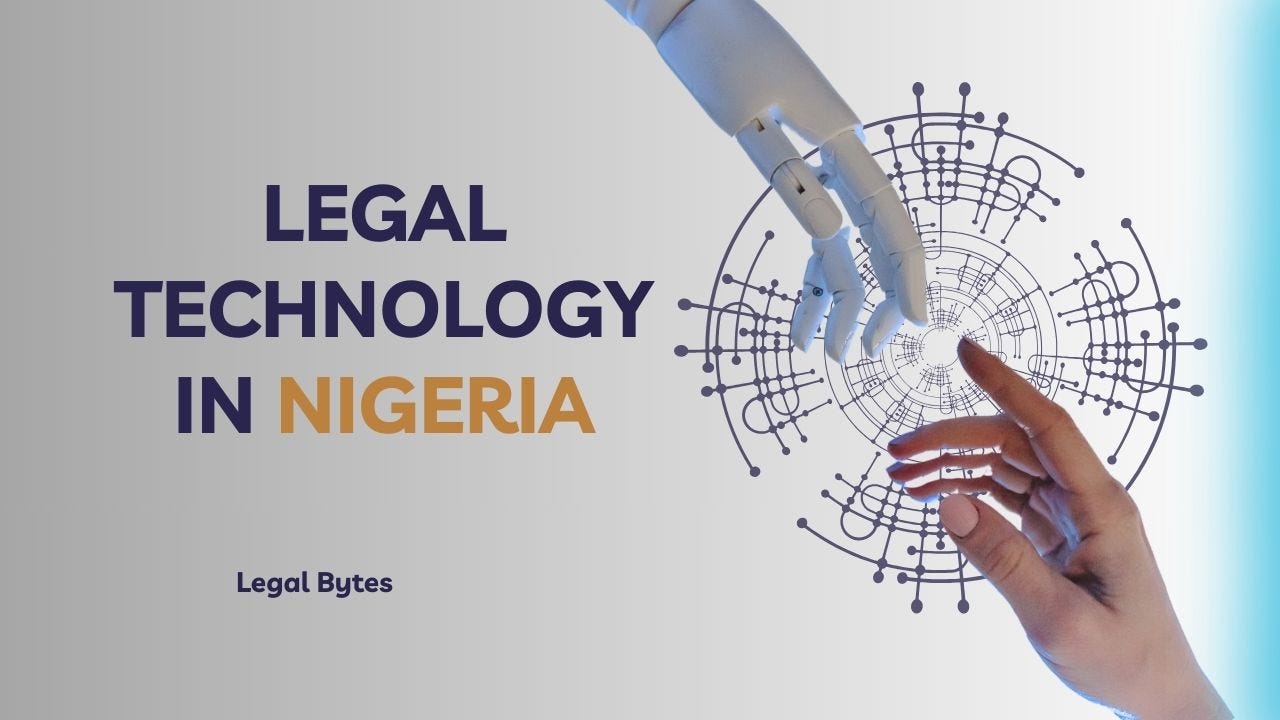LEGAL TECHNOLOGY IN NIGERIA
what is the impact of legal technology on the legal industry? How has the Nigerian legal industry leveraged technology to improve problem-solving within the legal industry?
According to Ryan Whalen,1 legal technology refers to “all devices capable of being used as a means for interacting with the substance of law or assisting its user to interact with the law, and the skills and techniques by which we use them.”. Simply put, it is the application of technology to streamline and improve legal services
In its manifold iterations, legal tech has affected legal research, case management, contract drafting, dispute resolution, and regulatory compliance, optimizing these tasks and increasing the efficiency of the lawyer’s performance.
In this article, we’ll dive into the essentials of legal tech in Nigeria, exploring its current state, potential benefits, key tools, and the regulatory and practical challenges involved.
1. Understanding the Current State of Legal Tech in Nigeria
Traditionally, Nigeria's legal sector has relied on manual processes and physical documentation, which is time-consuming, error-prone, and costly. However, the past decade has seen a wave of digital transformation within the legal industry with tools that automate and manage routine tasks like legal contract management, record-keeping, research, billing, etc. This has enhanced transparency and accountability within the legal system, resulting in increased client confidence and the preservation of legal documents for parties’ assurance.
Although this transformation, within the Nigerian context, is still emerging there are promising developments, such as:
Digital Case Management Systems: These systems help lawyers and law firms manage their cases more efficiently, with digital databases that store case files, legal research, client information, and documents. This technology reduces the need for physical filing and makes case tracking easier.
Legal Research Platforms: Artificial intelligence can accurately and quickly analyze vast amounts of legal data, enabling lawyers to perform legal research and legal analysis more efficiently. Online platforms like LawPavilion and Legalpedia provide access to Nigerian case law, statutes, and regulatory updates, streamlining the legal research process and offering comprehensive, up-to-date resources.
Automated Contract Generation Tools: Platforms that allow for the automated drafting of standard contracts, such as NDAs or employment contracts, are also gaining traction. These tools reduce drafting time and ensure compliance with Nigerian laws.
Electronic Filing and Court Automation: Some courts in Nigeria, including the Federal High Court, have adopted e-filing and case management systems, which enable the electronic filing of court documents, making the legal process more efficient and accessible.
Predictive Analytics: Although not rampantly used in Nigeria, certain artificial intelligence tools can predict case outcomes based on historical data, helping lawyers and clients make more informed decisions. This capability challenges the traditional methods of legal strategy and client management, offering a data-driven approach to legal practice.
Online Dispute Resolution (ODR): access to justice and justice itself can be delivered online instead of in a physical courtroom with the aid of technology. In Nigeria, where court congestion is a significant issue, ODR offers a feasible alternative.
2. Benefits of Legal Tech for Nigerian Practitioners and Clients
Legal tech can bring a range of benefits to Nigerian law practices, corporate clients, and individuals seeking legal assistance.
Among the primary advantages are:
Increased Efficiency: Legal tech tools help lawyers automate routine tasks, such as document review, legal research, and case management. By freeing up time, lawyers can focus more on strategic aspects of client cases and relationship building which generates more paying clients.
Cost Savings: Automation reduces the need for extensive administrative support, lowering operational costs for law firms. In turn, these cost savings can make legal services more affordable for clients.
Accessibility to Justice: Legal tech can bridge the gap in access to justice by providing online legal resources, virtual consultations, and e-filing options for clients who may be located in remote or underserved areas.
Enhanced Accuracy and Compliance: Legal tech tools with built-in compliance checks help ensure that legal documents adhere to Nigerian laws and regulations, reducing the risk of errors and legal penalties.
3. Key Legal Tech Tools for Nigerian Practitioners
Several legal tech solutions tailored to Nigeria's legal framework are available to help law firms and in-house legal teams operate more effectively:
LawPavilion: A comprehensive legal research platform with a database of Nigerian case law, statutes, and judgments. LawPavilion also includes tools for case analytics, making it a valuable resource for legal research.
Legalpedia: Another digital platform that provides Nigerian legal resources, Legalpedia is widely used by lawyers and law students for case law research, legislative updates, and more.
DocuSign and HelloSign: Secure electronic signature platforms like these can be used for legally binding signatures on contracts and agreements, which is especially helpful for remote transactions and cross-border deals.
Case Radar: A recently launched Nigerian legal tech solution was launched in Nigeria, whose features include an AI researcher, legal advisor, document generator, summarizer, and find-a-lawyer capabilities for clients.
DIYlawNG enables simple and convenient legal services based on user preference.
LFN App is a mobile application that provides access to all the Nigerian Laws
These tools are critical for modern Nigerian law firms and lawyers aiming to deliver more efficient, streamlined legal services, especially in the face of increased competition and client demand for digital-first services.
4. Regulatory and Practical Challenges for Legal Tech in Nigeria
The legal industry is often resistant to change, and while legal tech offers many advantages, several regulatory and practical challenges hinder its widespread adoption in Nigeria.
Key issues include:
Resistance to Change: many lawyers, judges, and other stakeholders within the judiciary resist technological advancements because they challenge traditional roles and processes. However, this resistance is quickly becoming flimsy as the legal industry evolves.
Data Privacy and Security: With the rise of digital tools, law firms must handle sensitive client information responsibly. Nigeria’s Data Protection Act (NDPA) mandates that personal data be stored securely, which requires law firms to invest in cybersecurity and data protection measures.
Lack of Digital Infrastructure: Limited internet access and inconsistent power supply in certain areas of Nigeria pose challenges to the seamless implementation of legal tech solutions.
Judiciary Adoption of Technology: Although some Nigerian courts are adopting digital processes like e-filing, these advancements are not yet widespread. A lack of uniform digital infrastructure across the judiciary means that lawyers often have to navigate both digital and physical court processes.
Legal and Ethical Concerns: As AI and automation tools become more prevalent, questions arise regarding their ethical use in legal practice. Nigerian regulatory bodies need to establish clear guidelines around AI’s role in legal advice and practice to ensure responsible implementation.
5. Practical Solutions and Strategies for Legal Tech Adoption
To overcome these challenges, Nigerian law firms, lawyers, corporate entities, and policymakers should consider adopting the following strategies:
Invest in Cybersecurity: To address data privacy concerns, law firms should invest in cybersecurity measures, such as encryption, secure cloud storage, and regular data audits, ensuring compliance with the NDPA and building client trust.
Public-Private Partnerships (PPP): Collaboration between the government, tech companies, and legal bodies can boost the adoption of legal tech. PPPs can drive investment in digital infrastructure, making tech solutions more accessible and affordable for legal practitioners.
Training and Skill Development: Lawyers and firms should prioritize tech training for their staff. This includes understanding how to use digital case management tools, online research platforms, and cybersecurity protocols.
Advocate for Legislative Updates: Legal professionals and industry leaders should advocate for updated regulations that facilitate the responsible use of legal tech. This includes clear guidelines on AI’s role in legal decision-making and data protection policies for digital law firms.
6. Emerging Trends in Legal Tech and Future Prospects in Nigeria
The legal tech landscape in Nigeria is evolving, with several key trends emerging:
AI-Powered Legal Assistance: AI tools are being developed to streamline document review, legal research, and case predictions. With the growing need for faster, more accurate service output, AI will become indispensable for legal professionals seeking efficiency and precision.
Blockchain and Smart Contracts: Blockchain technology is emerging in areas like real estate and finance, and its application to smart contracts can enhance transparency and efficiency in legal transactions. Nigeria’s growing interest in blockchain suggests that this technology could become a significant part of the legal tech ecosystem.
Virtual Law Firms and Remote Consultations: The COVID-19 pandemic accelerated the shift toward virtual consultations and remote work, and many Nigerian lawyers now offer remote legal services with flexible work arrangements. Virtual law firms eliminate geographic barriers, allowing lawyers to serve clients across Nigeria and beyond.
Rise of Non-Lawyer Tech Professionals: as technology continues to reshape legal practice, the demand for tech-savvy professionals within legal departments and law firms will increase. They will manage and implement legal tech solutions ensuring that firms and other corporate entities maximize the potential of legal tech, improving operational efficiency, data security, and client service.
Increased Value Proposition: legal tech has increased the client’s value appetite. Previously, lawyers charged a premium to fulfill routine legal tasks but the presence of technology, especially artificial intelligence, will force lawyers and firms to provide value beyond routine tasks and court appearances. More so, in-house legal teams will be measured more strictly, based on their direct contribution to the company’s bottom line. They will be required to justify their budgets, show measurable value, reduce external legal spending, speed up contract reviews, or minimize litigation costs, all while maintaining high compliance standards.
Conclusion
Legal tech offers Nigerian lawyers and firms the tools to improve efficiency, accessibility, and accuracy within the legal industry. However, challenges related to data privacy, regulatory compliance, and infrastructure persist, requiring a proactive approach from both practitioners and policymakers.
By investing in cybersecurity, advocating for legal reform, training, and collaborating on tech initiatives, Nigerian legal professionals can use legal tech to create a more modern, client-centered, and future-ready legal practice.
With the right strategies, legal tech could not only enhance the Nigerian legal profession but also make legal services more accessible to citizens across the country.
About Legal Bytes
We are Adune Legal’s weekly Newsletter, which simplifies the Law for Busy Executives, Entrepreneurs, and Tech Enthusiasts interested in the legal aspects of Business, Technology, and Intellectual Property.
We love emails from our readers— reply to this email and let us know your thoughts and suggestions.
WAIT!!!
Become a paid subscriber and access;
Q&A sessions with Nneoma Grace via chats on Substack.
Detailed Legal Templates and examples to save you time and legal fees
Expert Interviews and Case Studies
Don't miss out on these perks - subscribe today and start enjoying it!
Thanks for reading Legal Bytes
Adune Legal’s Team
P.S. Like Legal Bytes? Please forward us to a friend.
P.P.S. Was this publication forwarded to you? Sign up here & see previous publications.
See Ryan Whalen, “Defining Legal Technology and Its Implications” International Journal of Law and Information Technology, Volume 30, Issue 1, Spring 2022, Pages 47–67, available at https://doi.org/10.1093/ijlit/eaac005 accessed on 11-11-2024





